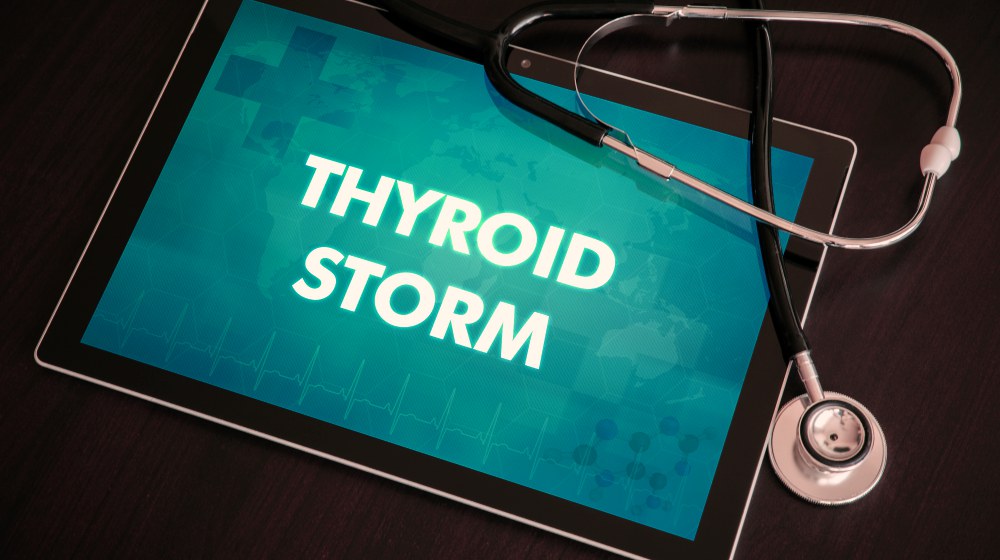Thyroid storm or thyrotoxic crisis is a rare yet dangerous and life-threatening complication of hyperthyroidism. This thyroid condition is clinically defined as the overactivity of the thyroid gland, where the patient may experience recurring fevers, persistent sweating, nausea, vomiting, and occasional fainting.
Read on to learn more about what it is, the symptoms that come with it, and how it can be treated.
RELATED: What Is Parathyroid Hormone? | Thyroid Symptoms
Thyroid Storm Information You Must Have
1. The Thyroid Gland

As we said, the thyroid storm is a complication of the overactivity of the thyroid gland. As such, you’ll need to understand what the thyroid gland is if you want to avoid this thyroid complication.
The thyroid gland is shaped like a butterfly and located at the base of the neck. It is part of the endocrine system, which is composed of organs that deliver, store, and release hormones into the circulatory system so the hormones can travel and reach the body’s cells.
The thyroid gland absorbs iodine from the food we eat to produce two main hormones: thyroxine (T4) and triiodothyronine (T3). They are responsible for regulating our body’s adrenaline and dopamine hormones, making it critical to our overall health.
T3 and T4 levels must be neither too low nor too high. The pituitary and hypothalamus are the two organs in the brain that work together to maintain the balance of the T3 and T4 hormones.
The hypothalamus creates thyrotropin-releasing hormone (TRH) that communicates to the pituitary, which then informs the thyroid gland to produce less or more of T3 and T4. T4 is responsible for either decreasing or increasing the release of a specific hormone called thyroid-stimulating hormone (TSH).
- When there is a low level of thyroid hormone (T3 and T4) in the blood, the pituitary gland increases the level of TSH to tell the thyroid gland to create more thyroid hormones.
- While if there is a high thyroid hormone level, the pituitary gland releases less TSH to the thyroid gland to lessen the production of these hormones.
2. The Thyrotoxic Crisis
Thyroid storm is called both a crisis and storm. It is a very rare thyroid dysfunction caused by improper hyperthyroid management and can be life-threatening.
In nationwide surveys, there are only 0.2 cases of the hyperthyroid crisis in every 100,000 people and approximately 1-2% of hyperthyroidism patients develop into a thyroid storm.
The manifestation of thyroid storm can be in multiform; therefore, it is tough to diagnose. Thyroid storm is even more difficult to diagnose in patients who suffer from trauma, are most likely to have changes in mental status, and suffer from sinus tachycardia.
Tachycardia Definition: A condition where your heartbeat runs faster than 100 times each minute
3. What Sets It Apart

Thyroid storm symptoms are hard to differentiate sometimes since they are quite similar to the symptoms of hyperthyroidism. What sets this thyroid complication apart is its symptoms are sudden and severe.
Though not all people with hyperthyroidism will progress to thyroid storm, however, improper management of thyroid storm is fatal. It is uncommon but can be life-threatening when it occurs.
A person with hyperthyroidism who exhibits any symptoms of thyroid storm is normally coursed through the emergency department. They can experience atrial fibrillation and high blood pressure, which can cause stroke and heart failure.
4. Thyroid Storm Signs and Symptoms
Thyroid storm is hyperthyroidism to the extreme. One of the most common clinical features of hyperthyroidism is when the thyroid gland is overactive.
This means the thyroid gland is producing too much of the thyroid hormones. Common symptoms of this thyroid dysfunction include:
- Heart rate over 140 bpm
- Fever tachycardia
- Atrial fibrillation
- Persistent sweating
- Mood changes
- Shortness of breath
- Unconsciousness
- Diarrhea
- Nausea
- Vomiting
5. Thyroid Storm Causes

Untreated hyperthyroidism diseases are the leading causes of thyroid storms. However, some of the other factors known to cause this thyroid dysfunction includes:
- Stress
- Trauma
- Stroke
- Lung infection
- Severe infection
- Pulmonary embolism
- Thyroid ablation
- An overdose of thyroid hormone supplements
- Drugs – such as amiodarone and radioiodine
6. Addressing the Condition
Moreover, professionals have always suggested that prevention is better than a cure. As such, we strongly advise that people with hyperthyroidism must address their condition as early as possible to avoid further complications.
Patients must adjust their lifestyles. Additionally, patients must consider the five B’s: block synthesis, block release, block T4 into T3 conversion, beta-blockers, and block enterohepatic circulation with cholestyramine when medicating.
RELATED: 9 Natural Thyroid Medicine Alternatives To Levothyroxine
7. Do Your Research and Consult the Professionals

It helps to do your own reading on thyroid storm, so you’ll be more knowledgeable about how to deal with this condition.
Overall, the best way to cure the thyroid storm is to prevent hyperthyroidism from reaching that level of complication. As such, immediately consult a physician as soon as you start feeling any of the prominent symptoms of thyroid storm.
Also, you can further boost your knowledge of the thyroid gland and its linking diseases by reading different articles about thyroid function studies on reputable thyroid symptom websites.
8. Thyroid Storm Treatment
Treatment for thyroid crisis starts as soon as your doctor suspects symptoms of the condition. You may be given antithyroid medications like methimazole and propylthiouracil to lower the thyroid hormone production.
In some cases, your physician may recommend radioactive iodine therapy to destroy the thyroid. If you’re pregnant and suffering from this health issue, radioactive iodine is not advisable as it can harm the child.
Surgery may be the best treatment of thyroid storm for pregnant women. Then, a synthetic version of the thyroid hormone is prescribed to be taken, possibly for life.
9. Prevention

Take your medications regularly to prevent this condition from getting worse.
There are only a few things to help prevent this progression:
- Strictly follow your health plan.
- Take your medications seriously.
- Keep all medical appointments with your physician.
10. What to Eat When You Experience Thyroid Storm
Spices
Several types of spices like black pepper, green chilies, and turmeric contain antioxidants that help fight free radicals causing damage to the thyroid cells. You can incorporate these spices to your daily recipes to not just get its thyroid benefits but also add flavor.
Healthy Fats
Some healthy fats like oleic acid in olive oil contain anti-inflammatory properties that can help balance thyroid hormones.
You can get these healthy fats from:
- Unsalted seeds and nuts
- Avocados
- Sunflower oil
- Safflower oil
- Coconut oil
- Olive oil
- Flaxseed oil
Vitamins and Minerals
Calcium, vitamin D, zinc, selenium, and iron are essential nutrients that help balance thyroid hormones. Selenium, for example, keeps your thyroid healthy by preventing cell damage.
You can get these nutrients from the following foods:
Vitamin D:
- Fatty fish
- Mushrooms
- Beef liver
- Vitamin D-fortified cereals and orange juice
Calcium:
- Calcium-fortified cereals and orange juice
- Almond milk
- Okra
- Kale
- White beans
- Collard greens
- Spinach
Zinc:
- Lamb
- Pumpkin seeds
- Mushrooms
- Cashews
- Cocoa powder
- Chickpeas
- Beef
Selenium:
- Sunflower seeds
- Turkey or chicken
- Oat bran
- Rice
- Beef or lamb
- Tea
- Mushrooms
- Chia seeds
- Brazil nuts
Iron:
- Whole grains
- Seeds
- Red meat
- Chicken or turkey
- Nuts
- Lentils
- Green leafy veggies
- Dried beans
Cruciferous Vegetables
This type of vegetables contain properties that can interfere with your thyroid’s ability to process iodine properly. These vegetables include:
- Rutabaga
- Mustard
- Kale
- Collard greens
- Cauliflower
- Cassava
- Brussel sprouts
- Broccoli
- Bok choy
- Bamboo shoots
Low-Iodine Foods
Eating low-iodine foods can reduce the amount of the nutrient your thyroid needs to process for the conversion of hormones. These foods are:
- Maple syrup
- Honey
- Potatoes
- Oats
- Non-iodized salt
- Unsalted nuts
- Egg whites
11. What Not to Eat When You Experience Thyroid Storm
Caffeine
Foods with caffeine like chocolate, tea, coffee, and soda can worsen the symptoms of thyroid storm and can lead to a rapid heart rate, irritability, nervousness, or anxiety. You can replace your favorite caffeine drinks with healthier options like a green smoothie or fresh fruit juice.
Soy
A study showed that soy could disrupt several treatments for hyperthyroidism. Avoid these foods:
- Soy-based creamers
- Tofu
- Soy sauce
- Soy milk
Gluten
This protein can trigger an immune response against the thyroid for people who are sensitive to gluten. If you’re not allergic to gluten, you can minimize taking it to be safe.
Foods with gluten are:
- Triticale
- Rye
- Malt
- Brewer’s yeast
- Barley
- Wheat
Nitrates
These chemicals may trigger your thyroid to obtain high amounts of iodine from your diet. Foods with nitrates are:
- Carrots
- Turnip
- Dill
- Fennel
- Cabbage
- Endive
- Leeks
- Beets
- Lettuce
- Processed meats like bacon or sausage
Foods High in Iodine
Iodine-rich foods can worsen the symptoms of thyroid storm, and you should avoid eating these:
- Foods with iodized salt
- Egg yolks
- Cheese
- Milk and dairy
- Kelp
- Nori
- Algae
- Agar-agar
- Carrageen
- Sushi
- Lobster
- Crabs
- Prawns
- Seaweed
12. How to Keep a Healthy Thyroid

1. Watch Out for Triclosan
Triclosan is an antibacterial chemical commonly found in body washes and soaps. A study revealed that exposure to this chemical could influence how your thyroid produces hormones.
Always check the label on your purchased grocery items, especially with soaps.
2. Lower Stress Levels
Chronic stress can accelerate the activity of the thyroid as it triggers an increase of cortisol in the body. You can ask your doctor how you can incorporate stress management into your daily activities.
You can also try performing relaxation techniques like yoga daily, having a massage, spending time with your loved ones, doing your hobbies, or going on a weekly short vacation.
3. Get Quality Sleep
Sleep deprivation can lead to an increase in your stress levels and a decrease in your energy. To promote better sleep quality, follow best practices before bedtime like:
- Taking an aromatic bath
- Reading books
- Listening to soft music
- Making sure your room is clean and convenient for sleeping
- Spending time with a loved one
- Relaxing
4. Quit Smoking
Cigarettes contain harmful chemicals that can increase the levels of the thyroid hormones and the incidence of toxic multinodular goiter. Stopping this vice can get difficult, so you might need your doctor’s help.
5. Get Regular Thyroid Tests
Visiting your physician for some thyroid tests can help you and them monitor the health of your gland. If you think you have symptoms of an overactive thyroid, let your doctor know to help them figure out your condition.
It also aids them in knowing where to start on their thyroid storm diagnosis.
6. Keep Your Adrenal Glands Healthy
Your thyroid and adrenals work hand in hand. The distress of your adrenals can negatively influence your thyroid.
One good way to keep them healthy is to get enough sleep each day to avoid stress on both glands. If you feel sleepy during the day, take a nap so you can recharge your body.
13. Long-Term Outlook
This condition needs immediate medical attention to help control hormone production. If not treated, it may cause serious complications like fluid-filled lungs or heart failure.
The mortality rate for those who have an untreated thyroid storm can increase by up to 75%. Surviving or controlling the condition can be less difficult if you immediately seek your doctor’s help.
Complications can also be avoided once you have control over your thyroid hormone again.
Proper management of hyperthyroidism and thyroid storm is the best way to prevent this rare complication. If you suspect you suffer from hyperthyroidism, you should speak with your doctor about running the appropriate lab tests to make a diagnosis.
Also, if you’re diagnosed, it’s essential to be diligent in taking your medication and keeping your follow-up appointments with your physician.
Did you find this article helpful? What other thyroid storm facts can you add? Share with us your thoughts in the comments section below! Let’s beat the thyroid storm together!
Up Next:
- Nodule On Thyroid Gland? What To Do Next
- 7 Symptoms Of Thyroid Cancer To Watch Out For
- High Omega 3 Levels Linked To Better Sleep Efficiency
Editor’s Note: This post was originally published on October 18, 2017, and has been updated for quality and relevancy.
/
5
(
2
votes
)
The post 13 Thyroid Storm Facts Thyroid-Patients Need To Know appeared first on Liv Health.


